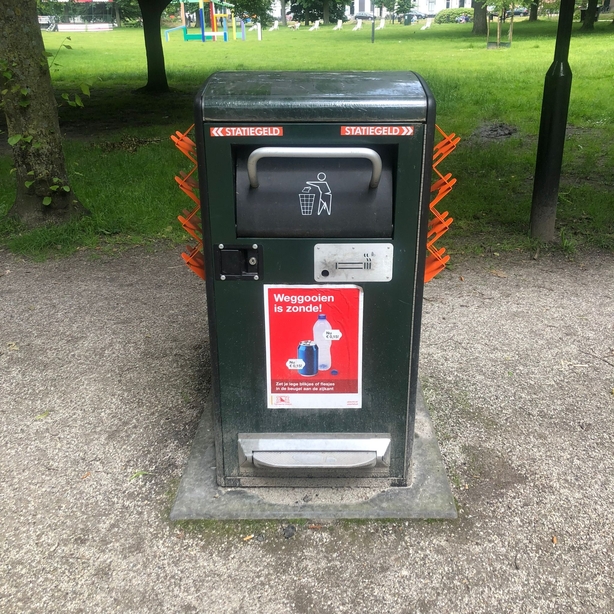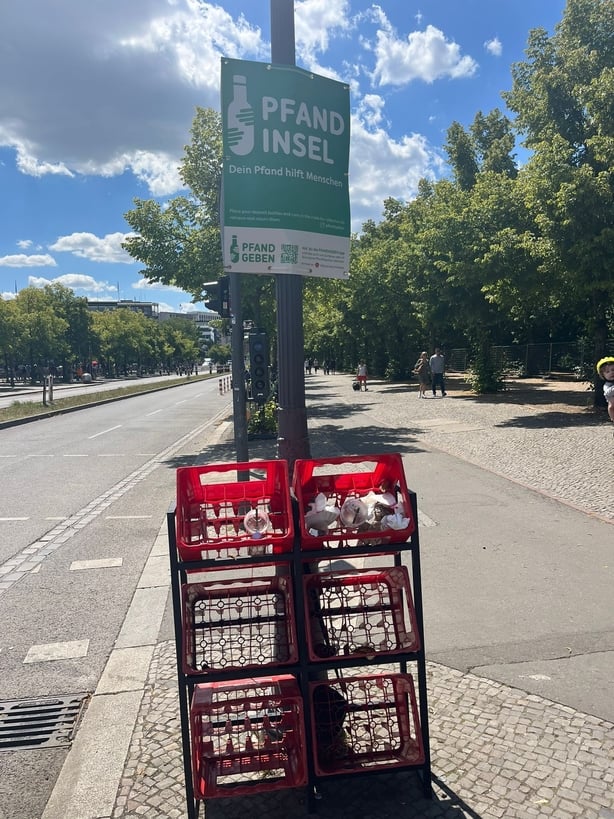Analysis: From holders on bins to donating your deposit, there are plenty of small ways for us to collect even more bottles and cans
This article is now available above as a Brainstorm podcast. You can subscribe to the Brainstorm podcast through Apple Podcasts, Stitcher, Spotify or wherever you get your podcasts.
When the Deposit Return Scheme was first launched in February 2024, 2 million plastic bottles and drinks cans were returned throughout the month. The figure increased tenfold to 20 million in March, 50 million in April, 75 million in May, and 90 million in June, to reach an average of three million bottles and cans per day.
In Denmark, where the scheme has been in place for a century, over 1 billion containers have been returned so far in 2024, compared to our over 300 million (though the Danish scheme includes some glass bottles too), so we're already doing a pretty solid job in a matter of months. The highest ever returned in a single day in Ireland was over 3.66 million drinks containers on Saturday July 13th.
The whole reason we're doing this is to step up our recycling game, reduce litter and waste, protect the environment, and to create a 'closed loop recycling system’ where cans and bottles get turned back into new cans and bottles, using recycled materials. We also have to achieve our EU plastic bottle recycling targets of 77% by 2025, and 90% by 2029.
We need your consent to load this rte-player contentWe use rte-player to manage extra content that can set cookies on your device and collect data about your activity. Please review their details and accept them to load the content.Manage Preferences
From RTÉ Radio 1's Morning Ireland, 30% reduction in plastic bottle and can litter on streets since introduction of Deposit Return Scheme
How were we doing before the Deposit Return Scheme was introduced? Well, approximately 60% of plastic bottles and cans were being collected for recycling through recycling bins. This means over 30% were not being collected, leading to increased littering and pollution. Now we’re trying to do in a handful of years, what some countries have had decades to achieve, so we need all the help we can get. Here are 5 things Ireland can learn from other deposit return schemes, and what behavioural psychology has to say about it.
Holders on the sides of bins for bottles and cans
Right now, if you buy a drink while you're out and about, there's no handy way to get rid of the container without locating a reverse vending machine or a shop that will take it back over the counter. But in countries like the Netherlands, Sweden and Denmark, you'll find bins with holders where you can leave your empty bottle or can. The idea is to pay it forward by passing on your deposit to someone who might need it more than you. But it's also simply about making sure bottles and cans don't end up in regular bins or as litter in nature.

Why might something like this help to increase engagement with the scheme? "When it comes to behaviour change across the board, anytime we are thinking about a behaviour change initiative or any sort of intervention, the first thing you think about is, well, how easy can we make this?", says Dr Shane Timmons, a senior research officer with the ESRI's Behavioural Research Unit. "The key aspects of behaviour change that crop up in different theoretical models are; making it easy, making it social."
Making it social, factors in things like social norms e.g being able to see that other people are doing it and therefore seeing you're not the only one taking on the extra burden. In that way, "the scheme probably works quite well," because the machines are in supermarkets and shops where we can see others using them, he says.
Where the scheme is trying to target behaviour the most is where people are not already recycling, says Timmons. "Recycling rates for plastic bottles and cans at home are already reasonably large, so for some people it's going to be an incentive to do so if they weren't already. But I think the vast majority of the effect of the scheme is targeting those events where perhaps people are not recycling because the facilities weren't there for them to do so."
We need your consent to load this rte-player contentWe use rte-player to manage extra content that can set cookies on your device and collect data about your activity. Please review their details and accept them to load the content.Manage Preferences
From RTÉ Radio 1's Liveline, listeners talk about why they're loving the Deposit Return Scheme
But behaviour change is hard, especially where people are trying "to change an ingrained habit", says Timmons. "If facilities aren't there for them to, say, recycle the can or bottle very easily when they're out in public, or at an event and so on, you really want to have mechanisms in place to make that easier. "That's where the side pocket to a bin [for bottles and cans] would make that easier and prevent them going into the general waste stream."
As humans, we don't love to change our behaviours. There's a well established cognitive bias called the status quo bias, he explains, "which really just describes how people have a strong preference for things to stay the way they are, even if they would like the alternative." On top of that, when faced with change we tend to "overweight any negatives", particularly when they impinge on our sense of fairness.
Donating your deposit to charity at the machine
When you bring your containers to the Reverse Vending Machines having the option to donate the deposit to one or more charities is a small way to to give back that adds up.
Collecting bottles and cans at big events
Wherever you find big gatherings of people, you often find litter. Especially if drinks can't be brought into gigs and sporting events. One way to collect all this waste is with collection points outside and inside venues, or charity drives where volunteers collect containers from attendees. That way, your deposit also goes to a good cause instead of to the bin.

This has already been kicked off in Ireland with the 'Return for Children' fundraising initiative, which supports Barnardos, Barretstown, Make-A-Wish Ireland, Jack & Jill Foundation, LauraLynn Children’s Hospice, and Childline by ISPCC. The goal is for people at festivals, concerts and sporting matches to return their bottles and cans to designated Re-turn bins with the deposits going to charity.
Being able to throw in all containers at once - even ones outside the scheme
For the minute, there's no way around having to feed the reverse vending machines your bottles and cans one by one. Depending on how long you've been saving them all up it can be a laborious task. In places like Denmark and Sweden, newer machines now allow you to simply dump them all in at once before it calculates your return. In Denmark, you can even download an app that'll deliver the deposit straight back into your bank account.
In Sweden, the machines will accept essentially any drinks container, even those that aren't part of the scheme, it just won't give you the money back, Ylva Andersson, research assistant in the ESRI’s Behavioural Research Unit tells Brainstorm. Other handy tips? Sinks for people to wash their hands after handling the (sometimes sticky) bottles and cans, and recycling and waste bins for used bags.
From Dansk Retursystem, a video showing how to use the Danish Deposit Return Scheme app for returning all your bottles and cans in one go
Part of the success of these schemes is that they become a natural part of people’s routines, says Andersson. For example, kids might deposit the household’s bottles as part of their weekly chores. Students who live in shared accommodation might use the deposit to purchase shared things for the household (like washing up liquid). "It’s also a nice way to get some money after you’ve organised a party."
Connecting the local to the global
"What we’re trying to do here is wide-scale habit formation for sustainability," says Dr Tadhg Macintyre, associate professor and environmental psychologist in Maynooth University. We’ve been successful in Ireland in the past with sustainability strategies and initiatives, but they’ve been isolated behaviours, he says. The key thing is for people to understand that the local is connected to the global.
Our engagement with the Deposit Return System needs to be connected to "a broader shift towards sustainability," Macintyre says. "This is probably the issue that we're missing the most; when we develop the singular initiatives, we should be connecting them to broader community initiatives."
Read more: Why this is probably the best bottle deposit scheme in the world
There are plenty of ways to do this; like linking active travel with recycling, or recycling with direct health benefits, or local community clean ups that would result in additional recycling and a financial bonus from the deposits, he outlines. In schools, classes could walk down to the local shop and learn about the Deposit Return Scheme as part of a recycling habit, he suggests. When something becomes community-driven, "people feel they've got skin in the game."
Another way to make people feel like they’ve got skin in the game, is by disseminating the data from the Reverse Vending Machines to show how many containers communities are returning and what they’re worth in deposits. Some business are already doing this. "That information should be part of a local campaign," says Macintyre. It would be like a 'positive feedback loop’, encouraging more engagement. "Giving data back to communities is a key to this being a success."
In Scandinavia, the social fabric of society is intertwined and connected by sustainability initiatives. "In Ireland, it’s probably more disconnected by those measures," he says. "That’s just where we’re at. We’re definitely progressing, but the connected piece is really important."
Follow RTÉ Brainstorm on WhatsApp and Instagram for more stories and updates
The views expressed here are those of the author and do not represent or reflect the views of RTÉ







